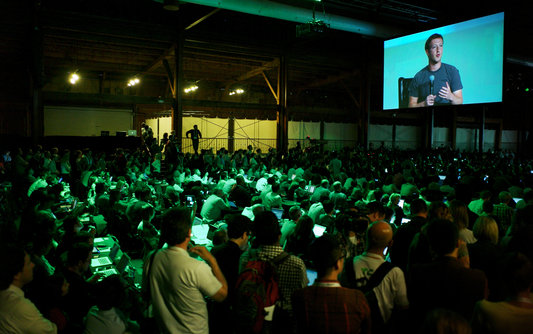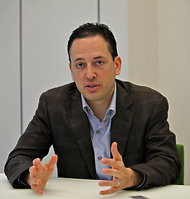 Nick Bilton/The New York Times Mark Zuckerberg spoke at a conference organized by TechCrunch in San Francisco on Sept. 11. He appears, very publicly and honestly, to focus on building a company, not on toys.
Nick Bilton/The New York Times Mark Zuckerberg spoke at a conference organized by TechCrunch in San Francisco on Sept. 11. He appears, very publicly and honestly, to focus on building a company, not on toys.
You don’t have to spend much time in Silicon Valley to start hearing that the people don’t care about money. People here are just trying to make the world a better place. Entrepreneurs and venture capitalists eat ramen noodles for dinner and drive old, clunky Hondas to work. If they do make money, that’s just a tiny cherry on top of their altruistic Tofutti soy whip sundae.
That’s what people here would like the world to think. Let’s be realistic, these start-ups aren’t nonprofit organizations.
The 1,500-square-mile area of Silicon Valley has seen the greatest wealth creation in history. According to the National Venture Capital Association, start-ups here raised $3.2 billion in venture capital just from April to June.
 Marilynn K. Yee/The New York Times David Sacks, the founder of Yammer, who sold his company to Microsoft this year for $1.2 billion.
Marilynn K. Yee/The New York Times David Sacks, the founder of Yammer, who sold his company to Microsoft this year for $1.2 billion.
The people making money from successful start-ups are spending it, too. Last month, RealtyTrac, a real estate analysis firm, reported that Silicon Valley led the nation in the number of homes sold for $1 million or more.
Let’s not forget the tone-deaf parties, like one for David Sacks, the founder of Yammer, who sold his company to Microsoft this year for $1.2 billion. He spent about $1.4 million on a 40th-birthday bash for himself. The theme was, “Let him eat cake.” Mr. Sacks asked guests not to share pictures of the event on social networks. Snoop Dogg, who was hired to sing at the party, shared pictures anyway of people in 18th-century French clothes.
At Facebook, the first 250 employees are on a highly secret list called TNR250, for The Nouveau Riche 250. They discuss things they plan to buy when they sell their hundreds of millions of dollars in stock: boats, planes, artwork, even an island. (To be fair, philanthropy is also discussed.)
But all of this is kept quiet and behind closed doors. Not shared publicly on social networks.
There are, of course, several reasons the Valley tries to keep its wealth so secret.
There’s the embarrassment left over from the dot-com crash, which began in 2000. True, the parties then would make today’s celebrations look like backyard barbecues with Betty Crocker cupcakes for birthday cake.
Still, some Valley denizens sense a shift has occurred as the wealth has become easy. “Today, being a venture capitalist is more about a lifestyle than it is about investing,” said Roger McNamee, a co-founder of the tech investment firm Elevation Partners. “They’re making a million bucks a year without generating much, if any, return. It’s like watching Fox News — these people are living in an alternate reality.”
This trend extends beyond the new fee-hungry venture capitalists. “Just as venture capital has become a lifestyle, you now have a generation where being an entrepreneur is a lifestyle,” he said. This is evident in the ease with which “entrepreneurs” are given millions of dollars to create companies that differ only slightly from other successful start-ups — like Instagram for video, or Twitter for cats.
But one of the biggest reasons people here try to pretend they don’t care about the money is that some of the most successful people actually don’t.
Steve Jobs, co-founder of Apple, was never driven by money. Mark Zuckerberg, founder of Facebook, appears, very publicly and honestly, to focus on building a company, not a six-car garage full of toys.
“Steve Jobs was very clear: he said, ‘Change the world, and the world will take good care of you,’ and people like Zuckerberg have absolutely followed that calling,” Mr. McNamee said. “But I think that you get one entrepreneur in 10 or 100 who is actually like that. For every Mark Zuckerberg, there are 10 guys pretending to be Mark Zuckerberg.”
The Valley doesn’t need to act as if it’s not interested in money — spending responsibly is a good thing. Focusing on making worthwhile start-ups grow is even better. We already have enough people pretending to be the Sun King.
E-mail: bilton@nytimes.com
This post has been revised to reflect the following correction:
Correction: September 16, 2012
An earlier version of this article referred imprecisely to the date of the dot-com crash. It began in 2000, not the late 1990s.
Article source: http://bits.blogs.nytimes.com/2012/09/16/disruptions-let-silicon-valley-eat-ramen-noodles/?partner=rss&emc=rss